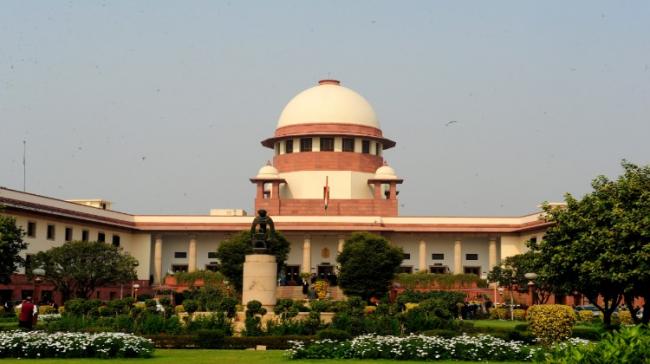Right To Choose Sexual Partner Fundamental Right: SC

New Delhi: The Supreme Court today said the right to sexual orientation is not a fundamental right but indicated that the right to choose a sexual partner is a fundamental right. A five-judge constitution bench headed by Chief Justice Dipak Misra and also comprising justices R F Nariman, A M Khanwilkar, D Y Chandrachud and Indu Malhotra was told by various petitioners that section 377 of the IPC violates various fundamental rights under articles 14, 15, 19 and 21 of the Constitution.
Advocate Saurabh Kripal, appearing for a petitioner resumed his arguments on challenge to the constitutional validity of section 377 and said that consensual sexual relationships between same sex is protected under Articles 14, 19 and 21 of the Constitution. While referring to various verdicts, Kripal said that right to choose one's partner is manifest in Article 21.
Also Read: Attorney General Not To Appear Before Supreme Court In Gay Sex Case
Advocate Maneka Guruswamy, appearing for some students from all Indian Institute of Technology, said that the section 377 which criminalises gay sex violates Article 14, 15, 19 and 21 of the Constitution because there is discrimination on the basis of sex. She said that the provision is a colonial era legacy and violates the fundamental rights of individuals enshrined in the Constitution.
"Section 377 is violative of Article 15 of Constitution because it discriminates on the basis of sex. It is based on Victorial morality and stereotypes an individual. Any kind of stereotyping is impermissible within the Constitution," she said and added that apex court has always intervened whenever legislature has been inactive.
Reading out a report of Indian Psychiatric Society, she said that it says same sex is normal variant and the society has favoured decriminalisation of section 377 as it is affecting lives of LGBT people. "The section 377 of the IPC should be read down as it making the lives of LGBT community miserable. Denies equal participation to them in professions," she said.
The Chief Justice then asked Guruswamy that is their any rule which prohibits homosexuals from availing equal opportunity. Guruswamy replied that the provision has a chilling effect in the community and even violates the fundamental right under Article 19(1)(C)(right to form association). Additional Solicitor General Tushar Mehta, appearing for the Centre, objected to the statement of Guruswamy saying that it was already made clear that nothing else will be debated except from constitutionality of section 377.
Justice Nariman took serious note of objections and said "she is well within her right to argue this aspect as several rights are involved in the issue and if you wish, you can later rebut it". The Chief Justice said that once the court holds that section 377 is unconstitutional then any disqualification based on 377 will be automatically lifted.
Also Read: SC To Decide Validity Of Section 377
"A declaration to this effect that section 377 is unconstitutional will remove the 'ancillary disqualification' for people joining services or contesting elections. It will also no longer be seen as a moral turpitude or a crime," the CJI said. Guruswamy continued her arguments and said that section 377 violates right to form association of sexual minority and the LGBT community is afraid of forming any kind of association fearing police action.
She said that there were 350 LGBTQ people who wanted to register themselves as an association but they were denied permission to do so by the authorities. Mehta on his part said that it would leave the aspect of constitutional validity to the wisdom of the court but said that if the right to choose a sex partner was recognised as a fundamental right, then somebody may come up and say that he or she wanted to marry a sibling, which would be contrary to the laws governing marriages.
To this, Justice Chandrachud said that the right to sexual orientation is not a fundamental right, but the right to choose one's sexual partner is a fundamental right. Senior advocate Anand Grover, appearing for one of the petitioners, said that this case is not only about decriminalisation of section 377 but about the constitutional values. He said that if the object is not fair than the validity of the statute cannot be sustained. He said that the LGBT community is subjected to blackmail and extortion by police and the 2013 verdict of apex court was wrong.
Some other lawyers including advocate Jayna Kothari and senior advocate Shyam Divan have advanced their arguments. The arguments remained inconclusive and would continue tomorrow. (PTI)




